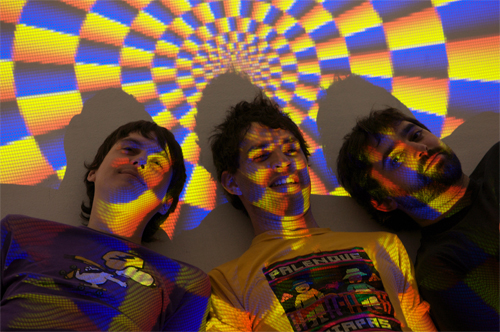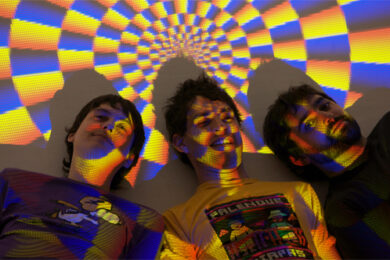The apocalyptic political philosopher John Gray is obsessed with the idea of human beings as animals. In his groundbreaking work Straw Dogs he argues that we share a common delusion that the golden age of humankind is just round the corner and that a lot of us honestly believe that just a few more years of struggling will grant us access to an idyllic lifestyle or heaven on earth. But, says Gray, this will never happen for us. We will no more enter the golden age of the human being than polar bears will enter the golden age of the polar bear. Recently Gray – who is, bizarrely, Mike Skinner’s favourite philosopher – has also written a book called Black Mass which links the neo-conservatism of Bush, the capitalism of Thatcher, the Nazism of Hitler and the communism of Stalin to the millennial, eschatological Revelation cults of the Middle Ages. It basically points out the inherent flaws in any system that presumes that we can achieve a utopia on earth, and the damage that these people always cause whether they believe in racial hygiene, a free market at any cost or that liberal democracy should be forcibly introduced to the Middle East.
The fantastic, psychedelic and experimental indie group Animal Collective are also obsessed with the idea of us being wildlife rather than so-called civilized human beings. Aside from their name, they feature members Panda Bear (responsible for the amazing Person Pitch album in 2007) and Avey Tare, whose name subconsciously suggests the term avatar, or a higher spirit visiting earth disguised as a lowly creature such as a bird or a tortoise. They create a digital and analogue stew of sweet noise combining sampled beats and synthesized textures, extensive use of FX pedals, as well as traditional rock and folk elements. They have released a string of imagination-capturing albums including the freak folk delight of Here Comes The Indian (2003), the hazy bucolic swell of Feels (2005) and now the orchestral psychedelia of Merriweather Post Pavillion. Tellingly, some of these albums were released via their own imprint Paw Tracks.
But these three musicians (they are a loose collective and Josh aka Deakin is sitting out this album and following tour for family reasons) have little in common with John Gray and his philosophy of self-awareness and pragmatism. They represent that most Christian of things: a desire to return to pre-Lapsarian times. They call for the impossible – a return to the Garden Of Eden. They believe in utopia.
Yet perhaps this is not so surprising. They are childhood friends from Baltimore County in Maryland. They grew up in what most people would consider were idyllic surroundings, enjoying rambling, fishing and outdoor pursuits as well as making their idiosyncratic music.
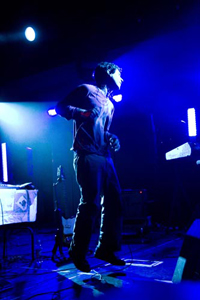
Today I’m talking to David Portner (Avey Tare) and Brian Weitz (Geologist) about their new album and it is obvious what a negative impact the urban environment has on their creativity. They talk intently (and with genuine passion) about how terrible they found living in New York and describe visiting Baltimore (the City) in the kind of terms that you or I would reserve for describing an enforced visit to a POW camp.
I start by asking them about the jarring difference between the pastoral Baltimore County that we know from their albums and the hellish Baltimore City we know from The Wire and the B-More scene. David is quick to agree: "The two things don’t have anything in common. We didn’t grow up in the city at all. Noah grew up closest to the city than any of us but it’s still nothing like what you see on The Wire."
Brian agrees with him: "There were no rock shows for all ages in the 90s, no bands came through. So it was good for high school age kids and for us because we had more of a DIY community and more shows took place in those neighbourhoods that you see in The Wire. But you weren’t really supposed to go outside and wander around, and most of the places you played had bullet proof glass. If you wanted to buy a packet of cigarettes at the store it was bullet proof glass everywhere."
And Dave adds ominously: "These places wouldn’t last that long either."
Trying to tease them about their idyllic view of life in the countryside – not one a farmer would share surely – I ask them about nature being red in tooth and claw? It’s not just urban environments that are violent. Do you think the actual violence and chaos of nature comes through in your music?
But Brian doesn’t see it and replies: "I think we relate more to the nature of Maryland in positive memories and any kind of violence or stress in our music comes more from time spent in urban environments."
Dave continues: "I think we appreciate the unpredictability of nature. Brian and I have always been big winter fans and I’ve definitely had experiences in Baltimore, Maryland which is definitely good for its snowstorms. That definitely influenced us a lot when we were younger, being stuck in certain places during storms."
Brian adds: "I guess weather is a good example of nature. I was thinking more like animals. Weather however is a good example of something where we appreciate the violence and unpredictability of nature. Especially on this record."
My first impression is that you’ve made one of your most accessible albums.
Brian: "It’s hard for us to judge accessible or not but everybody seems to have a different opinion on all of our records. I feel like you get one opinion and then you get the complete opposite, y’know. Like we thought Strawberry Jam was difficult and abrasive but people were like ‘Oh, it’s like the most poppy thing you guys have done and we’re really shocked and loving it.’ And it was the same with this one, we weren’t certain. There were times when we thought it was maybe a bit too weird. We realise it’s very melodic and it’s the most melodious thing we’ve done in the terms of all of our parts together in a while but some people are now saying our vocals are clear and up front and other people are saying the vocals are kind of washed out and tucked in, so you know, it’s kinda hard to say what the right view point is or what’s right or wrong."
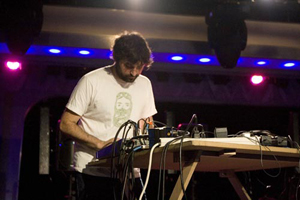
It was interesting for me that I was given your new album on the same day I was given the last Cure album (4:13 Dream) and I spent all weekend listening to them back to back. It was interesting because The Cure album is probably the most over-compressed thing I’ve ever heard in my life and it is impenetrable because of it, to the extent that it’s hard to differentiate between tracks. But with your album, even though there is so much more going on on it, it is so much easier on the ears. Do you have a philosophy that makes you keep the recording process quite simple?
Dave: "I think we’re very fortunate in a way with recording. We’re very conscious of how our music is produced and we pretty much are the producers and we have a hand in everything. But also the people we work with – right down to mastering and mixing – has an old school… I don’t really want to say anti-internet way of approaching mastering a record but everybody is aware that our music has a lot of dynamics to it I guess. And we like to preserve that dynamic because we are primarily a live band, even though we appreciate and like to be in the studio in a way our music is created for us playing live."
Brian: "But when we play live we like to have the loud moments and we like to have the quiet moments and if we compress everything there is none of that and it doesn’t feel natural. We like our music to feel natural basically."
Dave: "Now basically all the engineers we work with mastering and recording are against the ‘loudness war’ as everyone seems to be calling it. Especially in the mainstream commercial radio where there seems to be a school of thought that the louder a piece of music is the bigger the impact it will have on listeners just because people are listening to music so fast these days and moving from one thing to the next so quickly that there was this idea for a while that if in the middle of all this information your thing would be the loudest that people could hear then people would stop and listen to it for a while. You see that with the Metallica record and I don’t know about The Cure album but there seems to be a backlash against it in America, where even non-musical sources such as the Wall Street Journal and the New York Times have started writing articles about the downward trend in audio quality in music because of the digital loudness in competition. We’ve always worked with people who saw that coming."
Brian: "We didn’t really start out to be the type of people who are like ‘Oh, it must be as loud as it can be – just crank it!’ you know? We’ve always been more about having dynamics and quiet and acoustic stuff and stuff that’s a little more crazy. We never really even thought we had the amplifiers to actually do that to start with. And from that point of view we like to keep that thought process intact as we start to make new music."
Well, if there is a band out there who don’t have to make any kind of commercial decisions at all, then I’m yet to meet that band. And I can understand why a band (or more likely their record label) would want their single to sound loud on the radio but this is easy to sort out by sending out differently mastered singles or tracks to radio stations so they can compete in that market place. The reason why it bothers me is the fact that when you’re dealing with an album it has only been mastered like this to make it stand out on an MP3 playing device. No thought has been given to how the actual album will sound. And I fetishize the album not a random track on an MP3 player on shuffle.
Dave: "It becomes obvious to us when you compare one album by a group to another. For example we’re all big Pavement fans and I love that album Crooked Rain, Crooked Rain. But if you compare that to later albums they, to us, sound a little more compressed and little more flat and we never really got into those albums as much as the raw, live sounding early ones. And that’s how we want our records to sound; to keep that live, raw sound."
Where is Josh, and why is he absent from this record?
Brian: "We kind of knew this was going to be happening even before we made this record. We knew it while we were recording Strawberry Jam. We were really busy because we were writing and recording Strawberry Jam as we were touring Feels – in the same we did this record by doing it as we were supporting Strawberry Jam – but during that time while we were away a lot of intense stuff happened. His father passed away while we were away on tour in Russia and nobody was able to contact us for five days. It was a really hectic time and I guess he just wanted to take a break. It had become hectic because we had done more and more and it was getting busier and busier. We hadn’t really talked about it and he just said: ‘I want to take a break for a while and be at home.’ And we just came to an understanding that the three of us – Dave and Noah and I really wanted to keep playing and we were really anxious to move on from Strawberry Jam because we’d been playing the songs for a year and a half. We were inspired to work on new material right away. We had this tour coming up right away after we’d finished Strawberry Jam to all of these out of the way Midwestern cities that we never really play and Josh decided that he didn’t want to go. So we couldn’t play anything from Feels, which of course he’d played on, so we said we’d write a bunch of new material just to play on this tour as a three piece that will probably turn into an album and he was cool with that. The way it is is the way it’s always been and that is that the line-up doesn’t really change in the middle of an era or album, so if you’re there during the writing of the songs then you kind of see if through to completion until we start writing the next batch of stuff."
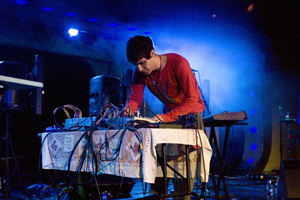
Anecdotally, Here Comes The Indian and Strawberry Jam were difficult to record. Do you find it easier working as three piece?
Dave: "Nah, I think they were difficult for other reasons, for personal reasons. Totally different reasons. Here Comes The Indian, just because of the nature of the times, trying to figure out where we were in our lives, we were at that age, you know, having to work full time at other jobs in New York. There’s that lifestyle in New York – being in a band is not easy. And we thought that was how we could make a name for ourselves as a band was to tour so we just wanted to get away on tour and it was just a difficult time, the tour we did for Here Comes The Indian which was really brutal and dark and kind of put our relationships at stake a little bit. When we started writing Strawberry Jam, Noah had just had his daughter we’d come off this high and out of this really productive time with Feels and going into Strawberry Jam, we were a little bit more displaced again. We were leaving our old label Fat Cat and we were like ‘What are we going to do musically? We used to write new music while we were out on tour, what are we doing? What are we putting together?’ So that was kind of like a really jagged process of putting together a record. Josh was having a lot of personal, psychological problems at the time so I think . . . yes. This was definitely an easier process for us. It was kind of like a breath of fresh air. For me if felt like going back to making music in high school or something like that. It felt like starting something new, experimenting with new ways of putting songs together and experimenting with new sounds because with Feels and Strawberry Jam we didn’t really . . . we got stuck with the electric guitar thing because Josh is primarily a guitar player. A really good guitar player. So we saw losing him as an opportunity to make music without the electric guitar."
Brain: "I’d just like to say that we are making music with him now. We’ve already started writing new material for the next project but it’s not a live project, it’s visual for a DVD."
Can you expand a little on what new experiments in sound that you tried on the new album, with regards to its lo-fi, symphonic feel?
Dave: "One thing we talked about was definitely trying to use a lot more acoustic sounds and samples for source material because especially for Strawberry Jam the sound was a lot more crispy, or sharp which wanted it to be. And we hadn’t done anything in a while that utilized a lot of acoustic sounds and field recordings and we wanted it to be a bit more natural and environmental than Strawberry Jam was. I think using samplers as opposed to using two guitars or drums live forced us to record ourselves playing those instruments. A lot of the beats are . . . we say samples but they’re really Noah playing the drums most of the time and then manipulated. So we experimented a lot in our practice space just recording a lot of drum tracks or guitar tracks or Brian collecting a lot of field recordings or acoustic instruments and trying to record that into a more symphonic kind of way of doing things. We were trying to orchestrate it."
Brian: "It was kind of in a way like Noah’s solo album was, sample based but not around other people’s music and this one was sort of a similar sort of process. We were the band that was being sampled for the record and then put back together for the record."
You don’t shroud your creative process in secrecy and perhaps it is inevitable that there are other bands who share similar recording techniques to yours; whether that’s your peers like Gang Gang Dance and Black Dice or newer artists like El Guincho or Women or even members from your own band like Noah/Panda Bear. When you record do you hermetically seal yourself off from that?
Both: "No."
Brian: "There’s a different situation with all of the things that you’ve mentioned. Gang Gang Dance and Black Dice and bands like that are bands we’ve known since we started and we’ve always admired their process and their way of making music. We get along with them first and foremost as people. Secondly we tour with them. With those bands we would never want to feel like we were ripping them off."
Dave: "We’re conscious of that fact that we might all have the same pedals and I think that we know when we’re messing around with the sound and I don’t know for those other people but for us we know pretty quickly if it’s a sound that’s unique to one of those other people then it’s off limits. It’s not just that it’s off limits because I don’t want to rip them off, it’s also because it’s not very fun to feel like you haven’t created something new."
Brian: "We respect their opinion of us. In terms of playing in New York with bands like that we always want to contribute to the way music is played in New York. The process is similar but our strengths are different to those bands as well so it’s more like we can’t do certain things that they can do and they can’t do certain things that we can do. That fear isn’t there. But something like El Guincho I think we are removed from. For us that came out of nowhere. I don’t think any of us have really heard it."
Dave: "I’ve heard the track that is supposed to sound a lot like a track from our new record. People have played me the track and said it sounds just like you guys and there’s been some talk about who is ripping off who but I’m happy to give him the benefit of the doubt. I mean, we never heard him before we wrote that song and he claims he never heard us before he wrote his song. They both sample Brazilian carnival rhythms, which to me is the big similarity in the songs. We were aware of it even before we recorded the song – this might sound like his song that he’s already put out there but since we’ve wrote it on our own, completely inspired by ourselves we didn’t feel we needed to worry about the comparisons that are going to be drawn."
Brian: "I would also say that seeing as Noah isn’t here it’s
probably safer for us to say that because we respect Noah’s music and what he does and has done for a while, that it seems like El Guincho’s record is inspired by Noah’s record (Person Pitch) but we could be wrong. They bear a lot of similarities in technique and in sound but since we don’t play on those records I think we can safely say maybe that’s the case but it’s hard to say these days, especially with the internet and everybody being able to be influenced by lots of different things and so much music being available to people, it’s hard to say I think."
An alternative version of this interview will appear in the February issue of the mighty Stool Pigeon. For more details visit the website.
Read Taylor Parkes’ full review of Merriweather Post Pavillion later this week. And here is Al Denny’s Track-by-Track Review. Animal Collective live photographs courtesy Shot2Bits.net.

